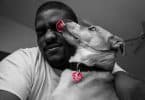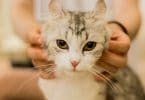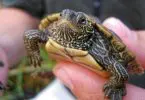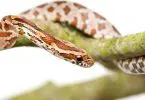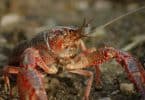Bearded dragons are one of the most docile pets anyone can have. They may seem scary at some angles. However, when you own them, they are super cool and comforting pets. In fact, bearded dragons as pets are low maintenance, intelligent, and easy to groom.
However, there is a common question pet owner ask before adopting any new pet, especially when it comes to having reptiles and amphibians as pets. Will their pet bit? Is it painful? How to avoid it? And most importantly, why does it bite
We got a lot of queries about the things that can trigger anxiety responses in bearded dragons. So, we decided to discuss them all here in detail. So, let us continue.
Table of Contents
Do Bearded Dragons Bite?
Yes, Bearded dragons do bite, but it rarely happens in response to extreme fear.
The bite of a bearded dragon is not very intense. It is because they have less strength in their lower jaws. So, it usually comes out like a stinging sensation that rarely needs a hospital visit.
Most of the time, the bite does not break your skin. But if it does, disinfect it, and it is good to go.
Why Do Bearded Dragons Bite?
Bearded dragons are usually well-behaved and mild pets that rarely get agitated. When kept as pets, they readily get along with their owners and respond to their calls. However, this friendly creature can express its furry and anger at some points or mark you as a possible threat.
Let us discuss under what circumstances bearded dragons can get
There can be three leading causes when a beardie bites you
- It is hungry(not fed anything/ not appropriately fed).
- It is protecting itself.
- You are building anxiety or fear in your pet.
- It is not comfortable socializing.
- You are mishandling them.
You see, the basic instincts of protection, shelter, and food are the triggers for any animal’s aggressive behaviors. And these are essential for their survival.
Let us talk about all these triggers in detail to understand better and avoid such situations.
Hunger:
One of the most common reasons for aggression in the bearded dragon is food. You can say that your little pet did not mean you any harm, but it bites your finger as it considers it food. Moreover, if you just have eaten something or handled any food material, your hands will smell the same, making your beardie take them wrong in reflex.
So, even if your dragon is fed correctly, and you reached them smelling like mellow juice fruits, they might bite you out of instinct. Bites, in this case, are usually not very painful.
Another way when food becomes the cause of the bite by your beardie, your feed it with your hands, and your fingers get in the way. So, if you are feeding a hungry beardie, move away quickly as it will be difficult
Self-Protection:
If you have just brought a tiny little bearded dragon at home and are wondering why they bite you, the answer is obvious. They are feeling frightened and considering you as a possible predator. So, they are hissed even if you get a little close. They may also attack you if you try to lift them.
Well, a bearded dragon rarely jumps off to bite you before giving any warning sign. Instead, they will most probably puff up their little beard or hiss to intimidate you. So, if you see any such signs, be cautious and step back immediately.
You Are Aggravating Agitation:
Any organism can become agitated by specific actions. So, even if any animal is known for its mild behavior and characteristics, continuously hitting its breaking points will result in no good. The same is the case with bearded dragons.
For example, if you brought a juvenile bearded dragon at home, and you want to have it in your lap all the time, you will be actually testing its patience. Moreover, it is not natural for animals to cuddle with humans. So, if you are in excessive cuddling and lifting up your beardie, there will be a high chance it shows an intense response.
Mostly such responses are accompanied by little warning triggers. And if you ignore them too, it results in a final attack or bites in severe cases.
So, bearded dragon behavior in this situation is a simple way of communication to tell you about their dislikes and comfort. So, therefore, you need to take care of that in the next interaction.
Mishandling:
Mishandling is one of the most significant causes of inciting aggressive behaviors in bearded dragons. You cannot pick a beardie from limbs or tail. As a rule of thumb, never try to restrict their motion or hold them by the neck so that it suffocates them.
Moreover, it is frequently seen that swooping the pet from above generates a tense response in them. It is because predators usually attack from the front or above. For example, birds pick them up from above, so they have the instinct to be aggressive if someone approached them from that end.
Moreover, never squeeze your pet r hold it too tight that makes it uncomfortable. High force can affect the fragile tissues in the body of a bearded dragon.
Holding a bearded dragon in the wrong way can instantly lead to unpleasant events. This can especially happen when children are handling a bearded dragon without supervision.
Not Duly Socialized:
When it comes to any animal’s behavior as a pet, you must know how important it is to socialize it at an early age. It is the same for the pets of all the classes, even in amphibians and reptiles.
Proper socialization is essential to ensure mild temperament in bearded dragons and make them habitual of human interaction. Suppose a pet is neglected and is not socialized. In that case, it will develop defensive and, in most cases, aggressive behaviors towards humans as they consider such large bodies coming towards them as potential predators.
Therefore, they bite, hiss, or puff their beards, you see, mainly to protect themselves.
It Is Overexcited:
You can relate to this situation easily if you have handled any furry pets. Furry pets are usually super friendly. However, when you go towards them holding their favorite snack, they may pound on you or possibly bite your hand if you are hand feeding them in excitement.
The same is the case with a bearded dragon. If your bearded dragon is getting a really delicious juicy sweet fruit or any other treat it get once in a blue moon, there is a high chance it may bite your hand in excitement.
Moreover, if your bearded dragon is hungry or loves to eat a lot, there is a high chance that the same excitement prevails every morning you feed it. So, it is neither a defensive behavior nor a protective measure but a mere over-excitement that made it make an unintentional move.
How To Avoid Bearded Dragon's Bite?
Understanding the body language of your pet is the key to avoid any unpleasant circumstances.
Feeding Schedule:
A bearded dragon will bite you when it is hungry. Therefore, feed your bearded dragon enough every time you feed it. Moreover, it is vital to provide a well-balanced diet to your beardie to keep it calm and healthy.
It is best to make a feeding schedule and follow it accurately. Do not delay the time of feeding as your pet will be impatiently expecting food from you. Also, it is not best to treat your pet with delicious treats at this time to avoid any bite.
Also, it is best to put the food in a bowl or feed it with a fork instead of hand feeding.
Change Your Feeding Strategy:
If your bearded dragon bites you every time you feed a delicious treat or a fruit, think it up as something from over-exciting. So, the best thing you can do in this case is to change the feeding strategy.
Avoid feeding by hand if biting got very frequent. You may also go for feeding tongs which makes feeding not only easy but also playful.
You may also place the reward treat in a feeding bowl and let your bearded dragon enjoy some “Me Time.”
Well, there can be hundreds of options you can explore according to your situations, even for happy, excited, happy bearded dragons.
Proper Socialization Is Essential:
The socialization of a bearded dragon starts from the house of the breeder. Therefore, we focus a lot on adopting a pet bearded dragon only from a reputable breeder.
Reputable bearded dragon breeders know how to take care of these pets from the very beginning and, most importantly, socialize them. They make them habitual of human touch and interaction.
Check Before Adopting:
One way of checking the temperament of a bearded dragon is to handle it before taking it to your home. Ask your vet or breeder to help you handle and pick a new bearded dragon correctly. You may then give it a go and see how it behaves.
Suppose you learn these things from the very beginning(even if you know how to). In that case, it will prevent many undesirable effects resulting from mishandling and misunderstanding of the behavior of your pet.
Moreover, it will give you confidence and introduce you to your pet in the most friendly way. This will lessen the chance of an aggressive reaction from the pet and also make it comfortable in your lap.
Handling before adopting is also essential as it will give you a better idea about your pet’s temperament.
Pick Them Up Correctly:
Never go for picking a pet from the top or from forward. It is more related to predators, which will generate an innate aggressive response for protection. So, your pet will try to bite you in reflex.
To pick up your pet right, reach towards them slowly, preferentially from sides. Hold them firm but do not squeeze them too tight to make them uncomfortable. However, your grip must be strong enough not to let them jump away.
When your child is handling a bearded dragon, it must be done under supervision. Do not allow children under five years to pick up a bearded dragon. It is because it gets uncomfortable for both, which can not only aggravate your beardie but can also make it bite your little one. Moreover, if your child holds it too tight or drops it in case of a bite, it will harm your pet a lot.
Therefore, teach your children to watch and enjoy the company of their pets from a distance.
What To Do If A Bearded Dragon Bites You?
It is best to avoid the bite of any reptile. Reptiles(including bearded dragons) have bacterias, especially Salmonella, on their skin. These bacterias are harmful to humans and cause the symptoms like food poisoning if it gets into the gut. Therefore, you need to wash your hands thoroughly after picking up a bearded dragon.
The same applies when you get a bite. Usually, you do not get any scratches, and the pain is mild. But if an adult big bearded dragon bites you, you may get a scratch or a cut on your skin. In this case, disinfect the wound properly. It would be best if you do it readily to avoid any bacterial infiltration into the blood. You may then also apply any wound healing topical ointment.
Also, if the wound is deep, you may need to apply some antimicrobial ointment. In this case, visit your doctor soon after disinfecting your wound. Your doctor may also prescribe you some analgesic to relieve the pain.
Frequently Asked Questions:
- Is A Beardie’s Bite Dangerous To Humans?
No, bearded dragons bites are not dangerous to humans. Bearded dragons have week lower jaws which do not give their bites enough strength. However, they do have multiple harmful bacteria on their skin that can enter your blood through the bite. Proper disinfection after a bite can help with this.
- Are Bearded Dragon Bites Poisonous?
No, bearded dragon bites are not poisonous like snakes or other venomous creatures. Also, they do not inject any secretion during the bite. So, most of the time, bearded dragon bites are not toxic for humans.
- How Bad Does A Bearded Dragon Bite Hurt?
Bearded dragon bites are not painful like that of bites of dogs and cats. It is mostly like a stinging pain.
- Can Bearded Dragons Bite Your Finger Off?
Bearded dragons do not cause much damage to humans. Mostly it is like a small scratch, a cut, or a sore finger. It can never bite your finger or any other body part off, even if it is wild and untamed.
Conclusion:
Bearded dragons are one of the most well-behaved pets that have a mild temperament. However, some breaking points can aggravate defensive responses in them. Try not to force anything on your pet. Keep the things slow and gentle if you are new to a bearded dragon. Your pet will gradually adopt the environment and become habitual of your presence.
If you have a bearded dragon from a good time and started biting you, you may need to look at the food part. Also, see if your beardie is doing it out of excitement. Moreover, if any factor in the environment is disturbing your pet, it may bite you to get your attention.



